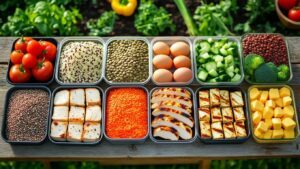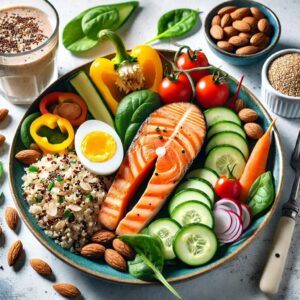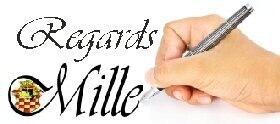 Protein isn’t just for building muscles or keeping you full longer. It’s like a personal cleaning crew for your body, helping out with its natural detoxification processes. Your liver’s main job is to filter out the nasties from your blood, and proteins play a crucial role by providing the amino acids needed for this.
Protein isn’t just for building muscles or keeping you full longer. It’s like a personal cleaning crew for your body, helping out with its natural detoxification processes. Your liver’s main job is to filter out the nasties from your blood, and proteins play a crucial role by providing the amino acids needed for this.
Essential amino acids like cysteine, glycine, and glutamine, which help the liver produce enzymes necessary for detoxification (like glutathione, a powerful antioxidant). These amino acids help produce glutathione, a powerful antioxidant that neutralizes toxins.
Certain amino acids (e.g., methionine and glycine) support phase 1 and phase 2 liver detoxification, helping to neutralize and remove toxins.
Think of them as the little building blocks that help enzymes do their jobs effectively in getting rid of toxins.
Amino acids in protein work like heavy lifters in heavy construction jobs, specifically aiding Phase 1 and Phase 2 of the liver detoxification pathways. They break down toxins and excrete them safely out of your body. Without enough amino acids, the body struggles to process toxins efficiently, kinda like a traffic jam in your liver!
Animal and plant proteins come well equipped to get things flowing smoothly. Everything from lean meats, eggs, beans, and nuts can get you started. They all deliver different essential amino acids, which are necessary for detoxification. But, balance is key—there’s no need to overstuff your system. Variety keeps your detox process well-oiled.
The best part? Incorporating protein can make you feel energized. When your body efficiently detoxes, you’re less likely to feel sluggish or bloated. Protein not only bolsters your detox process but also makes sure that you’re set for days where you need extra pep in your step.
Spotting the Signs: Indications that Your Body Needs More Protein
 Ever felt like you’ve just hit a wall right in the middle of your day? That constant drag might be your body whispering for more protein.
Ever felt like you’ve just hit a wall right in the middle of your day? That constant drag might be your body whispering for more protein.
Symptoms of protein deficiency include :
- Fatigue or sluggishness (since detox requires energy).
- Weak immune system (frequent colds, slow healing).
- Poor skin health (acne, dryness, or rashes).
- Reduced muscle mass, muscle loss or weakness.
- Brittle nails, hair thinning and hair loss.
- Brain fog or difficulty concentrating.
- Slower wound healing
- Formation of edema
Proteins aren’t just about muscles; they’re key for enzymatic functions that help break down and eliminate toxins. So if you’re feeling tired or slow, you might be missing out on those vital enzymes that need protein to work their magic.
Short spurts of tiredness aren’t always a cause for concern, but prolonged sluggishness could be something to watch out for. Long-term protein shortage might not just affect detox but could mess with those everyday functions like energy production, repair, and maintenance of cells that keep you ticking.
So how can you lend a helping hand to your system? Consider your intake of proteins from various sources. It could be a hearty scoop of chickpeas in your salad or an extra egg in the morning. Listening to your body and identifying these signs early on can guide you towards better detox support and balanced nutrition.
Synergy of Nutrients: Protein’s Collaborative Effect with Other Nutrients
 Protein is the buddy that likes to work well with others, especially when it comes to enhancing your overall well-being. Pairing proteins with other nutrients like fiber and vitamins? That’s where the magic happens! Together, they can improve digestion, increase energy levels, and just generally make you feel like a million bucks.
Protein is the buddy that likes to work well with others, especially when it comes to enhancing your overall well-being. Pairing proteins with other nutrients like fiber and vitamins? That’s where the magic happens! Together, they can improve digestion, increase energy levels, and just generally make you feel like a million bucks.
Ever noticed how combining protein with fiber-rich foods helps with digestion? While protein powers up your enzymes, fiber sweeps through your system, helping to keep everything moving along smoothly. This tag-team effort keeps the digestion process flowing and efficient, giving your body a boost in detoxification and nutrient absorption.
Vitamins are another piece of the puzzle. Proteins can assist in better absorption of these essential nutrients, making sure you actually get the benefits that your salad promised. Vitamin absorption is often enhanced when combined with protein, ensuring your body uses them efficiently to support daily functions that keep you energized.
The team up doesn’t stop with vitamins and fiber. Protein-rich diets also lift up your metabolic rate. Your body becomes more efficient in burning calories and converting food into energy, which can be a win-win for both weight management and maintaining those energy levels you’ve been striving for.
When it comes to a balanced plate, including a variety of nutrients alongside your proteins isn’t just smart; it’s essential. This way, you not only fuel your body but support all those daily functions that make life vibrant and enjoyable.
Building a Balanced Plate: Protein-Rich Meals and Sustainable Diet Strategies
 Creating meals that support both detox and overall health doesn’t have to be a chore. Picture this: a colorful plate filled with protein-rich foods, nourishing your body while tasting great. Start with something as simple as grilled chicken tossed with a salad loaded with mixed greens, cherry tomatoes, and avocado. Or a hearty bowl of quinoa mixed with black beans and roasted veggies topped with a sprinkle of feta cheese.
Creating meals that support both detox and overall health doesn’t have to be a chore. Picture this: a colorful plate filled with protein-rich foods, nourishing your body while tasting great. Start with something as simple as grilled chicken tossed with a salad loaded with mixed greens, cherry tomatoes, and avocado. Or a hearty bowl of quinoa mixed with black beans and roasted veggies topped with a sprinkle of feta cheese.
Adding variety keeps things exciting and ensures your body gets a range of amino acids. Imagine a breakfast of Greek yogurt with nuts and berries or a chickpea bowl with spices and a tangy dressing for lunch. This variety is what keeps your diet balanced and nutritionally complete, without feeling repetitive or restrictive.
While balancing protein intake, don’t forget plant-based options. Foods like lentils, tofu, and tempeh not only provide protein but are also packed with fiber and essential vitamins. These choices can fit smoothly into your daily meals, whether it’s a tofu stir fry or a comforting lentil soup.
Maintaining protein intake doesn’t have to mean overloading. It’s about finding that sweet spot where your meals are varied enough to keep your palate happy and balanced enough to support your body’s needs without excess. Having an understanding of portion sizes and incorporating a mix of both animal and plant proteins can set the foundation for a sustainable, healthy dietary habit.
Crafting a diet that’s balanced and varied is within reach. By mixing flavors and food sources, you ensure not just a nourishing meal but a sustainable lifestyle that supports detox and keeps you invigorated day in and day out.
Include protein with each meal by incorporating lean meats, yogurt, beans, fish, and nuts.
- Breakfast: Scrambled eggs with spinach and smoked salmon.
- Lunch: Quinoa and black bean salad with grilled chicken.
- Snack: Greek yogurt with almonds and berries.
- Dinner: Tofu stir-fry with mixed vegetables and brown rice.
- Smoothie: Plant-based protein powder, banana, almond butter, and flaxseeds.
How can you create a sustainable, balanced diet that includes enough protein without overloading your system
 Balance plant-based and animal proteins (lentils, fish, chicken, tofu, nuts).
Balance plant-based and animal proteins (lentils, fish, chicken, tofu, nuts).- Avoid excessive processed protein (too many protein bars/shakes).
- Stay hydrated to help flush out toxins.
- Rotate protein sources to get a variety of amino acids.
- Pair protein with fiber-rich foods for better digestion.
- B vitamins (found in eggs, legumes, meat) help break down protein for energy.
- Healthy fats (avocados, nuts) improve the absorption of fat-soluble vitamins.
- Fiber (from vegetables, whole grains) supports digestion and elimination of toxins.
- Antioxidants (from fruits and veggies) protect cells while detoxifying.


This article does a fantastic job of highlighting the importance of protein beyond just muscle building—it’s a powerhouse for detoxification and overall health! Many people don’t realize how essential amino acids support liver function and help the body eliminate toxins efficiently. The breakdown of how proteins assist in Phase 1 and Phase 2 detox pathways is especially insightful.
I also appreciate the emphasis on balance and variety when it comes to protein sources. A mix of both animal and plant-based proteins ensures we get a full spectrum of amino acids while keeping our meals interesting and nutritious. The meal suggestions are practical and easy to incorporate into a daily routine, making healthy eating feel more accessible.
Additionally, the reminder about pairing proteins with fiber, vitamins, and healthy fats is key. So often, people focus on protein alone without considering how other nutrients enhance its benefits. This holistic approach to nutrition ensures that we’re not just consuming protein but actually maximizing its effectiveness.
Overall, this post is an excellent guide for anyone looking to optimize their diet for better energy, detoxification, and long-term health!
How fascinating that proteins play a crucial role in detoxifying the body as well! A friend of mine has been on a high protein diet but I never really thought too much about the role of protein in food. I guess because I do eat a lot of meat but not enough fruits, veggies, and greens. I’ve always been told that’s where the nutrients came from. I can appreciate after reading the article how important it is to balance both vegan as well as meat sources. I have heard a lot of people claiming about the benefits of the vegan diet while at the same time many are deprived of essential nutrients and become ill from it. After reading about the importance of protein in nutrient absorption, this all becomes so clear! Too many fruit smoothies and raw vegan components in the diet!
Protein is so much more than just a muscle-builder—it’s a powerhouse for detoxification! I love how this article highlights the role of amino acids in supporting liver function and keeping our bodies running smoothly. It’s a great reminder that protein isn’t just about strength but also about overall health, energy, and balance. Incorporating a variety of protein sources, along with fiber and essential nutrients, seems like the perfect way to fuel the body efficiently. A well-balanced diet really does make a difference in how we feel every day!
I would like to express my gratitude for the insightful information shared in the articles on the importance of protein in our diets. The comprehensive discussion on how protein aids in detoxification, supports liver function, and enhances overall health has deepened my understanding of nutrition. Also, the practical tips for incorporating a variety of protein sources into daily meals are incredibly helpful. Thank you for providing such valuable insights that empower us to make informed dietary choices for better health and well-being.